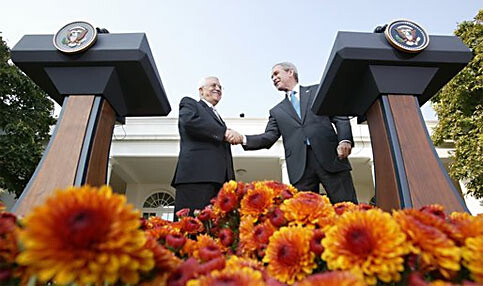The Electronic Intifada 23 October 2005

President George W. Bush and President Mahmoud Abbas, of the Palestinian Authority, shake hands after speaking with the media Thursday, Oct. 20, 2005, in the Rose Garden of the White House. (Photo: White House/Paul Morse)
President Bush rolled out the red carpet for his Palestinian protege, Mahmoud Abbas. The meeting in the Rose Garden, in terms of staging, equaled anything that President Clinton had done with his friend, Yasser Arafat, in the heyday of the Oslo agreements.
And the president stuck to his carefully concocted script, probably written by Steve Hadley in its original form. Bush said that he had had a good discussion with the president of the Palestinian Authority. Calling him “president” instead of just “chairman” is a slight step forward towards recognition of a Palestinian state.
Pessimists, on the one hand, believe that nothing will happen until after the Israeli elections, probably set for November 2006. And that means continued rolling violence between now and then.
Optimists, on the other hand, believe that incremental steps can eventually lead somewhere and give hope to the situation. That is where the administration is at the present time. On every occasion, including this one, they refer to the Roadmap, which even Israeli observers such as Yossi Beilin say is dead on arrival.
From what the President said, he wants to free up the Palestinians and give them a better life. Nothing new in that. And the only result to come from the meeting in Washington this week was a report in the press that behind the scenes the United States will not oppose the participation of Hamas in elections.
Almost immediately, the prime minister’s office in West Jerusalem said that Israel would not facilitate an election in which Hamas is allowed to participate. One of the Palestinian officials visiting Washington last week said that postponement of the election in January to the legislative council would trigger a third intifada.
If a Palestinian state were negotiated before the end of his term, he would “attend.” When asked about a timetable for such a state, George W. Bush waffled and only suggested that he would be satisfied with laying the groundwork.
The president has made a few cosmetic changes in American policy towards the Palestinians. He did mention the opening of a seaport sometime down the road, but apparently not of the airport in Gaza, as one of his early objectives. But his call for a link between Gaza and the West Bank and for Israel to stop expanding settlements is a simple regurgitation of American policy during the Oslo process. President Bush called for removal of “unauthorized” checkpoints, despite the fact they are all authorized in one way or another by the Israel Defense Forces on the ground. Now, such policies have a ring of the unreal, in view of the rejectionism of the Sharon government. The question will be who is more “persistent,” George W. Bush or Ariel Sharon.
He stood in the same spot in the Rose Garden two years ago and called for Israel to end its intrusions and end them now. Nothing happened. Does the president of the United States really believe Ariel Sharon has either the personal or political will to do everything now that would prevent a further violent escalation by the Palestinian insurgency?
Yes, of course, he and apparently even his professional team of foreign policy advisors believe they can cajole the prime minister of Israel to ignore the politics of land-grabbing and continuing to seek a military solution to a political problem, the continued occupation.
Realistically, the meeting only reiterated the need for the Palestinians to do much and the Israelis to do little or nothing to improve the life of almost four million Palestinians.
The new representative of the Palestinian Authority in Washington, Affif Safieh, will carry the title of ambassador and supposedly be recognized, a small step towards reality and recognition of the state.
The pilgrimage to the Rose Garden by the president of an unrecognized state of Palestine will be matched by a visit from the prime minister of a state that refuses to establish agreed borders. We can expect Sharon here in the next few weeks if past calendars of the Israel-Palestine dispute are followed.
And the President will probably again honor him by letting him stay at Blair House, the ultimate reward for presidential guests. When Patrice Lumumba visited Washington as head of an unrecognized rebel group throwing off the Belgian colonial heritage in the Congo, a Belgian diplomat was ordered to protest full state treatment of Lumumba, then considered a terrorist.
He said to his opposite number in the Department of State, “How can you let that man sleep in the same bed that my kin (Belgian) slept in only a few months ago?” The State desk officer replied, “Oh, we change the sheets.”
Perhaps Mahmoud Abbas will be invited to use that same guesthouse before the end of the Bush Administration. Don’t count on it.
Eugene Bird worked for the US Foreign Service from 1952-1975 and is the President of the Council for the National Interest, a non-profit, non-partisan grassroots organization advocating a new direction for U.S. Middle East policy. As CNI Founding Chairman Paul Findley notes, CNI is “motivated by the national interest of our country in Middle East policy… CNI provides a way for all citizens, regardless of religious affiliation or national origin, to speak out in an effective way. Those who participate can help advance the national interest in the Middle East and at the same time help repair the damage being done to our political institutions by the over-zealous tactics of Israel’s lobby.”




